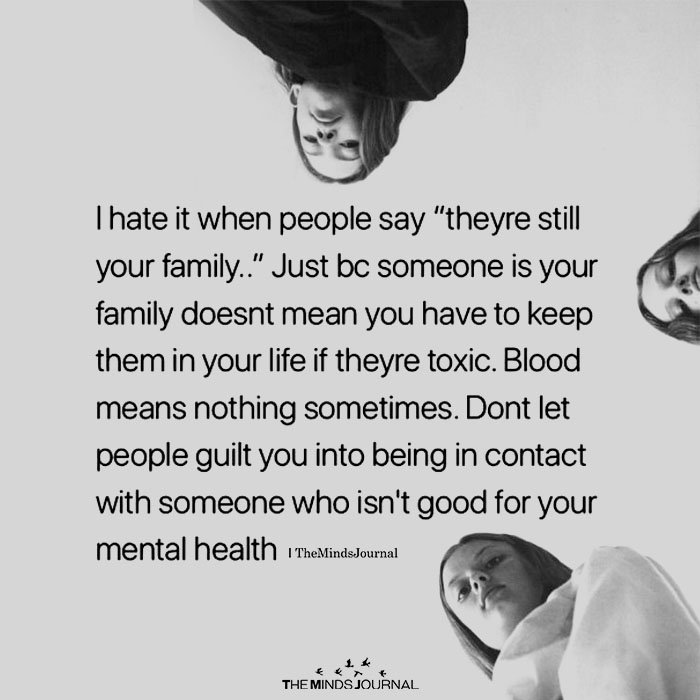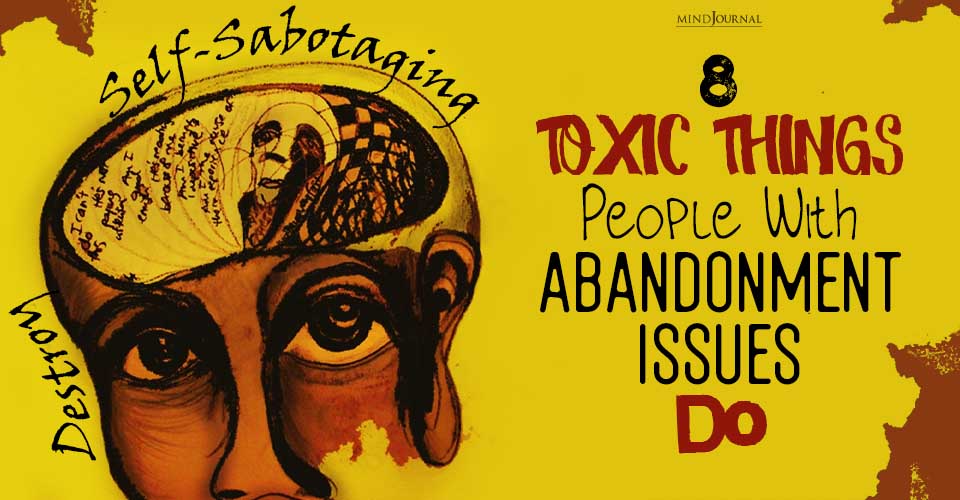Growing up in a toxic family can leave lasting marks, shaping behaviors and outlook on life in many ways. These are some of the signs you grew up in a dysfunctional family!
People who grew up in dysfunctional families always end up sharing some common traits amongst themselves, and chances are that all of them have had the same struggles while growing up.
A dysfunctional family creates the mess that we never intend to put ourselves in.
I met PB on a trek to the hills some years ago. We didn’t talk much initially, but when we did, our stories resonated the same beats, echoing into the far distances stretching before us.
Silence was frequent punctuation, as we dwelled and dealt and reasoned. We were both much younger at the time and apart from finding commonness in our experience of emotions, we had wondered what it was that made our accounts frighteningly similar.
Now I like to think, we simply didn’t have the vocabulary to communicate. In a matter of five days, we had spoken of anger, sadness, numbness, shame, and disconnection, in ways that we didn’t know we could.
Years later, one day, it occurred to me that we hadn’t articulated the obvious – both of us had roots in dysfunctional families. Our facts were as dissimilar as chalk is from cheese, while there being underlying themes that held similar sub-textual content. In time, I went on to meet other people, colleagues, friends, and neighbors, and space of mutual discloser came about.

What emerged were similar patterns separated by factual differences. Those conversations and discussions led me to write this piece
Here Are 7 Signs You Grew Up In A Dysfunctional Family
1. Excess self-blame.
It is typical of a dysfunctional family to be run by adults who display contrasting personalities – one being passive and dependent and the other being aggressive and individualistic and self-engrossed. In this utter perplexity, the child struggles to make sense of their own set of experiences and events unfolding around them.
The aggressive adult oppresses and dominates while the passive one is too apprehensive and submissive to protest.
At a sub-conscious level, a child has to depend unconditionally on their primary caregivers to survive. It is an evolutionary reflex.
So, at a conscious level, when caregivers fail to fulfill their responsibility towards the child, the child is left to believe that the fault resides in him/her and reasons out to himself about the lack of consistent availability of good parenting – he/she assumes that he/she isn’t worth the care and nurturance.
They remain so stressed, scared, and constricted before their emotionally inconsistent parents that they are left with no other choice but to blame themselves for every disagreement between their parents, for the emotional and physical neglect inflicted by them. Because these children are simply unable to play an adult role and take care of their parents, they often feel inadequate and guilty (1)
Now broaden the picture, and you’ll see how we end up carrying these early attitudes into our adulthood, especially if we aren’t initially aware of them.
Feeling dejected and persecuted and in turn, experiencing hurt and pain, becomes the norm.
Related: 13 Signs You’re Suffering From Toxic Family Enmeshment
2. Boundary issues.
Personal boundaries include the guidelines and limits one imposes on themselves to identify reasonable and permissible ways for other people to behave towards them and their choices of response to that when people trespass that limit.
A person brought up in a psychologically threatening environment of chaos and lack of order will grow up to create a sense of vague personal boundary for themselves. They will have no clarity of their choices, of their limits, and will be highly gullible in nature.
It’s often thought that only people from families with extreme abuse and manipulation, go on to face boundary issues. The assumption is that the abuse must have either been sexual, physical, or emotional in nature.
The assumption often is accompanied by the “looks of abuse”. In dysfunctional families though, abuse can have an entirely different appearance – it can occur in both overt and covert ways.
Consider caregivers who are over-religious and extremely authoritarian in nature or they are ego-centric in nature(making use of their children to satisfy their own ego-gratifying needs), whereas it is the child who needs emotional, educational, financial assistance and otherwise.
These instances, repeated over the length of a person’s childhood and sometimes even throughout teenage years, might not register as “abuse”, but the fact is they are.
The young person is unable to express his/her preferences and gets entangled in the obscure demands of his/her parents. This creates a massive discordance between their individual ideals, values that are formative in the teenage years, and the values and attitudes of their parents.
It negatively impacts their ability to create a clear sense of their own boundaries and respect themselves as they are growing up and often leads them to function in the exact same way even when they are grown up.
If you find yourself unable to say “no” where you’d like to, credulous, fickle-minded, indecisive or even have enough clarity about ‘safe choices’, you might be someone from a dysfunctional family set-up.
3. Constant validation seeking.
Before getting into the depth of this, let me make a confidential claim: everyone needs validation to an extent. The attention we seek from friends, the love we seek from partners, the acknowledgment we seek from colleagues – they are all rooted in validation of some kind.
Validation in itself isn’t wrong. However, when seeking is a result of crippling fear and feelings of inadequacy as it usually is among people who have origins in dysfunctional families, then that is an issue.
People who insistently and persistently seek validation typically have two fears:
- That they are not worthy enough.
- They will be jilted or abandoned if they are not up to the mark.
These latent fears mostly have their roots in a person’s childhood, during which they were supposed to be nurtured unconditionally.
Parents from dysfunctional families will seldom express their emotions. These repressed emotions will act as a model before the child to also abandon their emotions leading to an insecure attachment with the parents and issues like low self-esteem.
An authoritarian style of parenting can also lead to a lack of display of affection in situations like a love that was a result of academic achievements or for fulfilling one or two of the conditions set by parents pass on the subliminal message that “If you please, then you are valued”.
This insecurity becomes as profound as one learns that one’s value is temporal and conditional that he/she starts feeding her/his insecure self with constant validation.
4. Constant need for support.
People who had their early years with dysfunctional caregivers, often experience a sense of responsibility towards others at the cost of their own needs and wants. This is mostly a compensatory behavior towards what they lacked in childhood.
As children, they may have seen abuse, drug use, incessant fighting or neglect. And in a scenario, where the adults failed to show up with adequate assertive behavior, they made themselves available as proxy. Making themselves responsible for other people’s grief, happiness, discomfort, pleasure and every other feeling state possible.
As adults, the same people might find themselves struggling to make choices without consulting parents, friends, co-workers, and the like. They may experience a consistent disconnection from their own dreams and aspirations because the latter would require them to give up their selflessness.
Related: Ways to Break Free From Toxic Family Members
5. Anxiety issues.
For a second, pause and imagine a child hiding from angry parents screaming and I cite this from a film I had seen long back but can’t remember the name of. What it made me feel then, is exactly how it makes me feel now – fearful, terrified, and extremely anxious.
Anxiety as defined by the Oxford Dictionary is “a feeling of worry, nervousness, or unease about something with an uncertain outcome.”
For anyone who grew up in dysfunctional families and in a threatening atmosphere of uncertainty, anxiety is the most natural response. It is natural for a child to feel hapless in such an obnoxious situation. They were receiving a clear message – “The world is unsafe.”
When a person has not worked through these early experiences of extreme fear, they will invariably feel triggered by happenings even in the present.
From slightly loud noises, aggressive people, from a lack of information to loss of a job, anything could potentially fire them up to feel a heightened sense of impending doom.
6. Emotional volatility.
A person who is emotionally volatile has no control over their ever-changing emotions from one extremity of the spectrum to another. Emotional volatility is characterized by being calm one second and becoming enraged or overly sad the next. People jump between emotional highs and lows in a mere matter of seconds. (2)
It is naturally understandable that such an unsteady emotional experience is very disturbing not only to the one who is experiencing it but also to the ones this person interacts with. They act so unpredictably that they come off as unstable and shady to other people – often opening the gates to misunderstanding.
Either of the parents in a dysfunctional family setup is found to be emotionally volatile themselves. They are even inconsistent in expressing their affections if they ever do. The parents might displace their own frustrations onto their children when they least expect it to be while showering them with love when they never saw it coming.
Children who grew up in dysfunctional families see this type of shallow, unstable display of emotions and this makes them pick up this pattern of emotional instability and teaches them that adult responses are not predictable.
“Children are educated by what the grown-up is and not by his talk.” – Carl Jung
If you frequently hear your friends speak about your unpredictable emotional upheavals, then it might be a feature you have imbibed since your childhood.
7. Trust issues.
“It is easier to build strong children than to repair broken men.” – Frederick Douglass
We are all at the mercy of our past experiences.
Inconsistent parenting is characterized by the constant absence of a nurturing primary caregiver, a lack of proper display of emotions, lack of emotional and physical support, and incapability of the parents to meet the basic needs of the child.
These shortcomings on the parents’ part can hugely determine how their children will grow up to be a teenager and subsequently into an adult.
Related: 10 Do’s and Don’ts To Keep Your Parenting Healthy and Non-Toxic
Children who have been neglected both physically and mentally during the growing years will not be able to establish a secure attachment with their parents, the primary attachment figures in their lives.
If they fail to trust their parents to give them assistance and take responsibility then how can they ever learn to extend their feelings of faith to the people outside their families? It becomes a huge difficulty for them to bring confidence to other people in social interactions and interpersonal relationships later on in their lives.
A family is supposed to be god’s abode. But sometime they are creators of the monsters.
“The happy family is a myth for many.” ― Carolyn Spring
References:
Cost of Growing up in Dysfunctional Family.
What does it mean if someone is emotionally volatile?













Leave a Reply